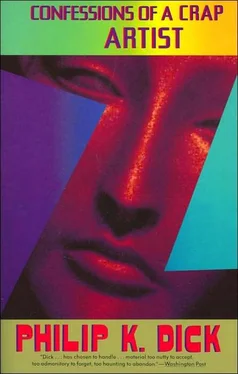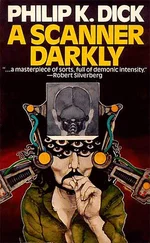Now his lawyer stepped slightly back. The courtroom was a little noisy, because, in the rear, a lawyer was consulting in low tones with his client and two people in the front were talking and rustling. Nat began to answer.
“Well,” he said, “the reasons are that for the most part—” He paused, feeling the fatigue and languor brought on him by the pill. The sense of weight. “Are that she was never at home,” he said. “She was always out somewhere and when she came back even though I asked her where she had been, all she did was vilify me and tell me it was none of my business. She made it abundantly clear that she preferred the company of other men to mine.”
He tried to think what else to say. How to continue. All he seemed able to do was gaze out at the lawn beyond the windows, the warm, green, dry lawn. He felt terribly sleepy, and his eyes started to shut. His voice had trailed off, and only with great effort could he resume any sort of speech.
“It seemed to me,” he went on, “that there was nothing but contempt for me in her all the time. I could never depend on her to back me up in anything. She went her own way. She never acted like a married woman. It was as if we weren’t married in the first place. The result of this was that I couldn’t earn my living. I got sick and had to consult a physician.” He paused, and then he thought of the name of a physician. “Doctor Robert Andrews,” he said. “In San Francisco.”
The judge said, “What was the nature of this illness?”
Nathan said, “What would be called a psychoneurotic complaint.” He waited, but the judge had no comment. So he resumed. “I found myself unable to concentrate or work, and my friends all noticed this. This went on for a long period. At one time she stood on the front porch and shouted abuse at me that even the town’s minister heard. He happened to be getting ready to visit us.”
That had been the day that Gwen had moved her things out. Some neighbor had evidently realized what was happening, that their marriage was breaking up, and had called old Doctor Sebastian. The old man had come by in his 1949 Hudson just at the height of the argument between them; Gwen, on the front porch with an armload of towels, had screamed at him that he was a no-good bastard and that as far as she was concerned he could go to hell. The old man had gotten back into his Hudson and driven off. Apparently he had given up any idea of trying to help them, either because he realized that it was too late and he could do no good, or because what Gwen had said was too much for him. He simply was too frail to stand the stress.
Anyhow, Nathan thought, as he gazed out at the warm lawn and the sunlight, the shops and people, she finished packing her things and then I drove her and them to her family’s house in Sacramento. I even gave her back the snapshots of her that I carried in my wallet.
The courtroom was silent, waiting for him to go on. Waiting to see if he had anything more to say about the break-up of his marriage.
He said, “It was intolerable to me to be treated that way, as if I was second in importance to other men. I found strange cars sometimes parked in front of my own house, and when I got home I found men sitting there that I had never in my life seen before. And when I asked her who they were she became so enraged and vilified me so completely that even the other man became embarrassed. He asked to leave, but she told him to stay.”
How strange it feels, he thought. To be up here, telling these things.
“Anyhow,” he said, “she had rages in which she deliberately destroyed objects that were of importance to me.”
While she had been packing her things she had come across a plaster cat which they had won at Playland. She had been holding it, wondering how to pack it, when he had told her that he considered it his. At that point, she had turned and thrown it at him. The cat had broken against the wall behind him.
“She had these violent rages,” he said, “where she couldn’t control herself.”
His lawyer nodded to him—impatiently, it seemed to him—and he realized suddenly that he had finished. Getting to his feet he stepped down. His lawyer called their witness, and Nathan found himself seated in the first chair of the jury box, listening to their witness tell how he had come by the Anteil house and found only Mr. Anteil at home, and how, on frequent occasions, when he had found them both together, he had been forced to listen to what he considered unfair and humiliating tirades on the part of Mrs. Anteil, directed at her husband.
The judge signed the paper; he and the lawyer exchanged a few words; and then Nathan and their witness and the lawyer walked up the aisle and out of the courtroom.
“Did he grant it?” he asked the lawyer.
“Oh sure,” the lawyer said. “Now we go down to the clerk and get a copy of the interlocutory decree for you.”
As they descended the stairs, the witness said, “You know, Gwen’s about the most mild-mannered woman I’ve ever known. I felt funny up there talking about her ‘tirades.’ I never heard her raise her voice in my life.”
The lawyer giggled at that. Nathan said nothing. But he felt a sense of release, a lifting of the burden of the court action. They entered the clerk’s office, an immense, brightly-lit place in which rows of people worked at desks and file cabinets. At a counter which ran the width of the room, persons conducted their business with the many deputy clerks.
“Well, it’s over,” the witness said, while the lawyer got the papers.
Was there any truth to what I said? Nathan wondered. Some truth. Part true, part made up. Strange to lose sight, blend it together. No longer know what had happened, merely talk, tell what seems appropriate. Aloud, he said, “Like the Moscow Trials. Confessing to whatever they want.”
Again his lawyer giggled. The witness winked at him.
But he did feel better. Dread of the ordeal … that was over, like the school play. Public speaking in assembly.
“Good to get it over,” he said to his lawyer.
“Boy, that old man is a tough one,” his lawyer said, as they left the clerk’s office. “Not letting me lead—he probably didn’t have a good bowel movement and felt like getting back at the world.”
Outdoors, in the sunlight, they parted company. Each of them said good-bye and went off to his own car.
The time was ten-forty. Only an hour and ten minutes had gone by since the court had been called into session.
Divorced, Nathan thought. Over and done. Somebody else up there, now.
Reaching his car he got into it and sat.
Strange story to tell, he thought. When was she ever away from the house? Only when we broke up.
I should feel guilty, he thought. Getting up there and letting all those lies come out of me, that mishmash. That uninspired recitation. But his sense of release overcame any guilt. God damn, he thought. I’m so god damn glad it’s over.
All at once he felt doubt. How can it be over? You mean I’m no longer married? What happened to Gwen? I don’t understand it. Where did it go? How could a thing like this happen?
It isn’t possible, he thought. What do you mean, I’m no longer married?
He stared out the car window. It doesn’t make sense, he thought. Dismay, as if he were about to break down and cry, started everywhere inside him, appeared on all sides, throughout. I’ll be god damned, he thought. It just can’t be. It isn’t possible.
This is the most awful thing that ever happened to me, he thought. It’s weird.-It’s the end of me, of my life. Now what am I going to do?
How did I ever get into this situation?
He sat watching the people go by, wondering how a thing of this sort could have come about. I must have let myself get mixed up in something horrible, he thought. It’s as if the whole sky is a web that dropped over me and snared me. Probably she’s the one who did it; Fay arranged all this, and I had nothing to do with it. I have no control of myself or anything that’s happened. So now I’m waking up. I’m awake, he thought. Discovering that everything has been taken away from me. I’ve been destroyed, and now that I’m awake all I can do is realize it; I can’t do anything. It’s too late to do anything. It’s already happened. The shock of getting up there and telling that account made me see. Mixture of lies and bits of truth. Woven together. Unable to see where each starts.
Читать дальше










